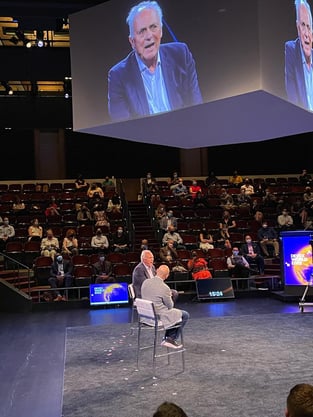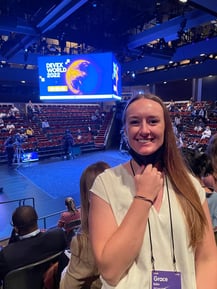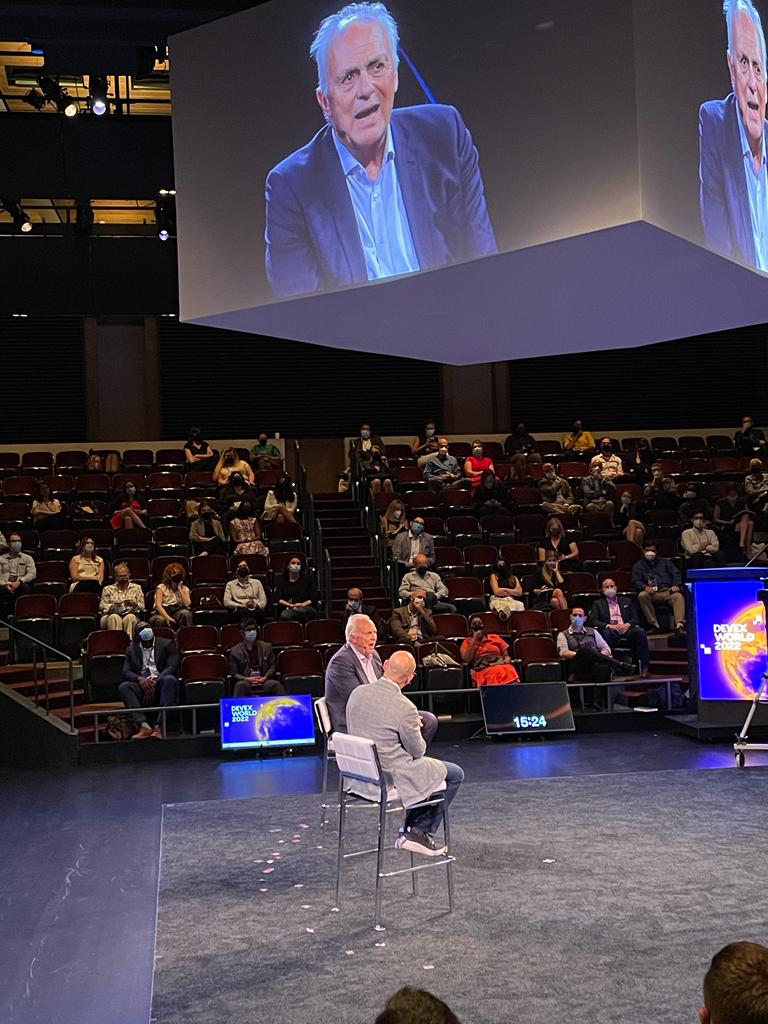Devex World 2022: Reflections on the Future of Development Finance
Last week I had the privilege of attending Devex World, a global development conference held in Washington D.C. After two and a half years of limited in-person interaction, it was invigorating to see fresh faces, hear what they are currently working on, and listen to a diverse and innovative set of speakers. The focus areas of this year’s event were: Business Transforming Development, From Story-Telling to Movement Building, Data Revolution, Innovation at Scale, and most prominent to me across all the sessions, the Future of Development Finance.
Evolving global context and funding landscape
From the start of the day, attendees heard about some of the key challenges facing the development community: compounding crises of food, energy, and debt playing out against the backdrop of a world still grappling with the on-going COVID-19 pandemic, the war in Ukraine, and an increasingly perilous climate catastrophe. Speakers presented on actions taken by international organizations and multilaterals, governments, funders, and civil society actors to combat these problems. As the day progressed, an interesting tension surfaced regarding the appropriate role between these players, especially how best to finance necessary change.
The day began with Bill Gates, the co-chair of the Bill and Melinda Gates Foundation, discussing pandemic preparedness saying “All these aid budgets now face real pressure because of refugee costs, food costs…and we are still digging out of debt levels and problems that the pandemic has presented us so these are challenging times”. When asked about the role of private philanthropy compared to government funding for global health he said, “There’s no way private philanthropy has the scale or the legitimacy…nor can private philanthropy fund that high a percentage of the global health needs. That is rich country aid budgets…These crises we are facing right now – philanthropy is only going to scale up at a gradual level, so in no way is it a substitute for government money.”
These comments were followed by Kristalina Georgieva, the Managing Director of the International Monetary Fund (IMF), who discussed the responsibility of the global community and international organizations and coalitions to build this required resilience and sustainability particularly in lower- and lower-middle-income countries. She considered this to include the development of social safety nets as a macro-critical issue, an end to which we see many advocacy organizations working as well.
What this means for the development community
This question about government aid budgets versus private philanthropy is particularly interesting for SRI Executive’s clients who are largely dependent on one or both types of funding. With increased competition for government funding in the current global context, our clients have been seeking to further understand the trends and limits of private philanthropy and how they should navigate them. 
These considerations were touched upon throughout the day and echoed many of the issues we see our clients (both funders and NGOs) grappling with today: navigating localization, taking an intersectional approach, and changing operating models as longer-term and unrestricted or general support grants become more prevalent. McKenzie Scott’s ears were likely burning as she was held up as an example of an individual who has embraced trust-based philanthropy to allocate a portion of her astronomical wealth by making large, unrestricted grants to primarily women and BIPOC-led organizations increasingly at the grassroots level. Trust-based philanthropy, an approach that looks to those with lived experience to decide the best approach for tackling problems within their own context without being directive, is creating new opportunities for NGOs and civil society recipients. While funding availability is still a concern, the possibility of less restrictive funding to accelerate the impact these actors may have with more coherent and strategic action in the long-term is an exciting possibility.
While the development community may hope that McKenzie Scott and others like her serve as an example for those in their tax bracket, this style of funding is not without some criticism. Often there is limited transparency and accountability of the grants they make and their altruistic motives are called into question compared to the personal tax benefits they enjoy. There is a healthy skepticism of individuals who pledge to financially support organizations working for systemic change “presumably to upend the very systems that make them as wealthy as they were…an internal contradiction” as said by Kavita Ramdas, the founder of KNR Sisters, a consulting practice in Gender Justice Philanthropy.
Our experience: SRI Executive
Through our Search and Strategy work, SRI has already seen the way organizations have begun considering this evolution in funding through both their people and how they work. Some of our recent work with NGOs and public-private partnerships has demonstrated:
- Changing requirements for fundraising roles to be able to work flexibly with different types of institutions and actors
- Decentralizing fundraising responsibilities
- Reviewing communications strategies aimed at funders to draw on the lived experience of staff, partners, and beneficiaries
- Diversifying revenue streams and considering income generation approaches outside of traditional grants
- Changing operating models to use both structured and unrestricted funds as donors continue to provide both and increasingly test more flexible models
- Redefining impact and how it is measured as organizations begin to consider longer time horizons
 Even amongst our clients who are funders, we see them reflect on the composition of their staff, leadership teams, and boards, how they reflect who they serve and what skills and competencies they bring. They are also reflecting on how they make decisions, and, increasingly, how their funding can be led by the communities with whom they work. Changing operating models to use both structured and unrestricted funds as donors continue to provide both and increasingly test more flexible models
Even amongst our clients who are funders, we see them reflect on the composition of their staff, leadership teams, and boards, how they reflect who they serve and what skills and competencies they bring. They are also reflecting on how they make decisions, and, increasingly, how their funding can be led by the communities with whom they work. Changing operating models to use both structured and unrestricted funds as donors continue to provide both and increasingly test more flexible models This conversation certainly does not end with the event, and we look forward to supporting our clients as they navigate their next steps. We are eager to learn more about how others are working through these challenges and invite you to connect with us to discuss further. Feel free to contact us here to discuss more.
All Devex World recordings are available online.


